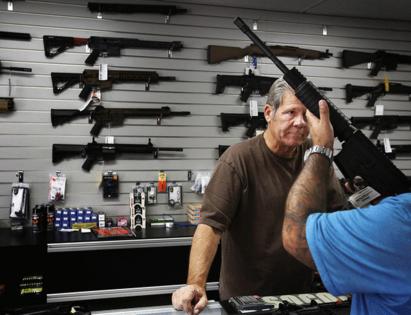Supreme Court rejects Maryland AR-15 case, and interest groups respond
Published in Political News
BALTIMORE — It’s not clear if the Supreme Court’s decision to deny two gun cases, including a challenge to a Maryland ban on AR-15s, a semi-automatic rifle, will influence how other gun cases are determined. However, gun owners say the split-court’s case rejection reflects skepticism from some justices that the ban is constitutional.
“Four members of the Court, including Justice Kavanaugh, have made clear that the Fourth Circuit incorrectly decided the case,” said Mark Pennak, president of Maryland Shall Issue, a group advocating for gun owner rights expansion. In his view, the court’s rejection only “temporarily” allows the ban to hold. “Once the Court grants review of the issue, the decision in that case will be controlling precedent in MD and elsewhere. If plaintiffs win on this issue in that case, the Maryland law will fail as well,” he said.
The ban was enacted in response to the 2012 Sandy Hook Elementary shooting in Newton, Connecticut, where 20 children and six school staff members were killed. The Maryland case, Snope v. Brown, was declined alongside a Rhode Island case which contested a ban on high-capacity gun magazines.
While Justices Samuel Alito, Neil Gorsuch and Clarence Thomas said they would hear the case, four of the nine Supreme Court justices must agree to hear a case. Justice Brett Kavanaugh said he expects the court will address the issue of AR-15 legality “in the next Term or two.” Kavanaugh also said that AR–15s are legal in 41 of the 50 States, which makes Maryland’s law, relatively, “something of an outlier.”
Gun control advocates, including several Maryland elected officials, felt relieved at the high court’s decision, saying that Marylanders are safer with the ban in place.
Daniel Webster, Bloomberg Professor of American Health in Violence Prevention at the Johns Hopkins Bloomberg School of Public Health, said that he views the court’s rejection of the case favorably.
“I think it’ll mean that assault weapon ban will stay in, and I think that that’s generally a good thing in terms of public safety,” Webster said. “And I think that that is a policy that most Marylanders support for sure.” He also said that there are other states where similar bans have been challenged on Second Amendment grounds, but most courts have supported the bans.
Maryland Congressman Glenn Ivey, a Democrat, posted on X, “This decision sends a clear message: states can take bold action to protect their communities from gun violence. Marylanders shouldn’t have to live in fear of weapons of war on our streets.” He also expressed his commitment to supporting “common-sense gun laws that save lives and uphold our Constitution” in the future.
Maryland Sen. Chris Van Hollen, a Democrat, also voiced support for the Court’s decision. “Maryland passed its ban on military-style assault weapons after the Sandy Hook massacre,” he posted on X. “SCOTUS should continue to allow lifesaving laws like Maryland’s to remain in place.”
Maryland Attorney General Anthony Brown, the defendant in Snope v. Brown, said in a statement that the Supreme Court’s case rejection means the state’s ban “that prevents senseless and preventable deaths” will remain in effect. “Our Office will continue to advocate for gun safety laws at the General Assembly and will defend Maryland’s common-sense gun reforms in court. We will do whatever we can to protect Marylanders from this horrific violence,” the statement said.
________
©2025 Baltimore Sun. Visit baltimoresun.com. Distributed by Tribune Content Agency, LLC.

























































Comments